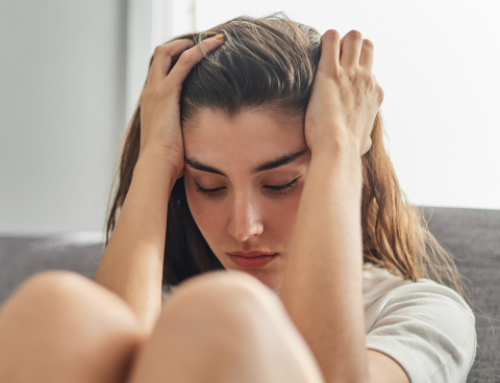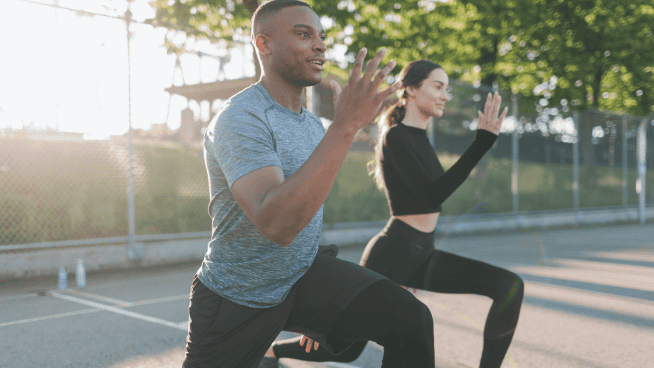How To Manage Anxiety With Exercise
How to manage anxiety with exercise
Athlete or not, anxiety is on the rise today. The good news for all is that exercise can help reduce stress. You might be familiar with some of the great benefits that exercise has on your body, but exercise has tons of benefits on the brain. Before we discuss those, let’s discuss anxiety.
What is Anxiety?
Anxiety is a normal and natural response to stress, and anxiety looks different for all of us. I think it is safe to say that no matter how you experience anxiety, all of us who experience it can describe it as a feeling of dread or uneasiness. You might experience such things as shortness of breath, sweaty palms, or trembling. Or you might experience anxiety on the inside by having racing thoughts or feeling restless and tense. Some things might increase anxiety-like wanting to perform well, or sometimes we can just be anxious. No matter how or when you experience anxiety, it’s okay.
Anxiety vs. stress
When you are experiencing anxiety, your brain and body are reacting to stress. Stress is not always a bad thing. For instance, when you strength train, you need to expose your muscles to outside stress to get stronger. This initial stress causes your muscles to break down. Your muscles make sure that they build back up stronger so that the next time they are exposed to that same stress, it will be easier on them. This mechanism is how you get stronger. Too much stress can become a bad thing, though. If you strength train too much without letting your body adapt to the outside stressors, your body will grow weaker rather than stronger. You will be breaking your body own without giving it time to build itself up.
What Goes On In The Brain During Anxiety
Similarly, too much mental stress in the brain will not allow your mind to grow stronger. Too much stress leads to anxiety, and overtime, too much anxiety can cause your brain to become overloaded with stress-related hormones. A constant influx of stress hormones can actually cause your brain to change, and not in a healthy, stronger way. There are many things we can do to decrease anxiety’s effects on the brain. Exercise is a prime example. Exercise can help combat some of the negative changes that result from too much stress and anxiety. Here is how:
Benefits Exercise Has on the Brain
- Increase feel-good hormones (runner’s high)
- Decrease stress receptors
- Increase blood flow, which is necessary for you to learn and to practice positivity
- Lower blood pressure
- Lower heart rate
- Improve respiration
The Practical Part
The benefits listed are direct opposites of what goes on in the brain during anxiety. For instance, the benefits listed are similar effects as anti-depressants. You are your best research experiment. Get your body moving to see the effects exercise has on anxiety. Here are some tips in the meantime:
- Make time to move your body without practice or pressure.
- No equipment necessary – push-ups, hang on monkey bars or a grab a high tree branch, air squats, jump around, chase your dog, try to be The Flash, etc.
- Practice yoga, Tai-chai, or another practice that causes you to slow down and bring awareness to your body
- Stretch your body
- Go for walks in nature and leave your screens at home
Last Thing
You can also manage anxiety with your breath. You can set a timer for as short or as long as you would like while you focus on taking deep breaths. You can lay down and think about times you felt at your best or visualize yourself reaching your goals. You can also take a moment to reflect on how your body is feeling and notice where you feel your anxiety. You can even do muscle contracting and releasing exercises that are described in the link above.
Anxiety is not going anywhere. It is a natural human response. Exercise is just one of the many things we can do so anxiety does not get to the point where it breaks us down rather than build us up.
RECOMMENDED FOR YOU
MOST POPULAR
How To Manage Anxiety With Exercise
How to manage anxiety with exercise
Athlete or not, anxiety is on the rise today. The good news for all is that exercise can help reduce stress. You might be familiar with some of the great benefits that exercise has on your body, but exercise has tons of benefits on the brain. Before we discuss those, let’s discuss anxiety.
What is Anxiety?
Anxiety is a normal and natural response to stress, and anxiety looks different for all of us. I think it is safe to say that no matter how you experience anxiety, all of us who experience it can describe it as a feeling of dread or uneasiness. You might experience such things as shortness of breath, sweaty palms, or trembling. Or you might experience anxiety on the inside by having racing thoughts or feeling restless and tense. Some things might increase anxiety-like wanting to perform well, or sometimes we can just be anxious. No matter how or when you experience anxiety, it’s okay.
Anxiety vs. stress
When you are experiencing anxiety, your brain and body are reacting to stress. Stress is not always a bad thing. For instance, when you strength train, you need to expose your muscles to outside stress to get stronger. This initial stress causes your muscles to break down. Your muscles make sure that they build back up stronger so that the next time they are exposed to that same stress, it will be easier on them. This mechanism is how you get stronger. Too much stress can become a bad thing, though. If you strength train too much without letting your body adapt to the outside stressors, your body will grow weaker rather than stronger. You will be breaking your body own without giving it time to build itself up.
What Goes On In The Brain During Anxiety
Similarly, too much mental stress in the brain will not allow your mind to grow stronger. Too much stress leads to anxiety, and overtime, too much anxiety can cause your brain to become overloaded with stress-related hormones. A constant influx of stress hormones can actually cause your brain to change, and not in a healthy, stronger way. There are many things we can do to decrease anxiety’s effects on the brain. Exercise is a prime example. Exercise can help combat some of the negative changes that result from too much stress and anxiety. Here is how:
Benefits Exercise Has on the Brain
- Increase feel-good hormones (runner’s high)
- Decrease stress receptors
- Increase blood flow, which is necessary for you to learn and to practice positivity
- Lower blood pressure
- Lower heart rate
- Improve respiration
The Practical Part
The benefits listed are direct opposites of what goes on in the brain during anxiety. For instance, the benefits listed are similar effects as anti-depressants. You are your best research experiment. Get your body moving to see the effects exercise has on anxiety. Here are some tips in the meantime:
- Make time to move your body without practice or pressure.
- No equipment necessary – push-ups, hang on monkey bars or a grab a high tree branch, air squats, jump around, chase your dog, try to be The Flash, etc.
- Practice yoga, Tai-chai, or another practice that causes you to slow down and bring awareness to your body
- Stretch your body
- Go for walks in nature and leave your screens at home
Last Thing
You can also manage anxiety with your breath. You can set a timer for as short or as long as you would like while you focus on taking deep breaths. You can lay down and think about times you felt at your best or visualize yourself reaching your goals. You can also take a moment to reflect on how your body is feeling and notice where you feel your anxiety. You can even do muscle contracting and releasing exercises that are described in the link above.
Anxiety is not going anywhere. It is a natural human response. Exercise is just one of the many things we can do so anxiety does not get to the point where it breaks us down rather than build us up.












